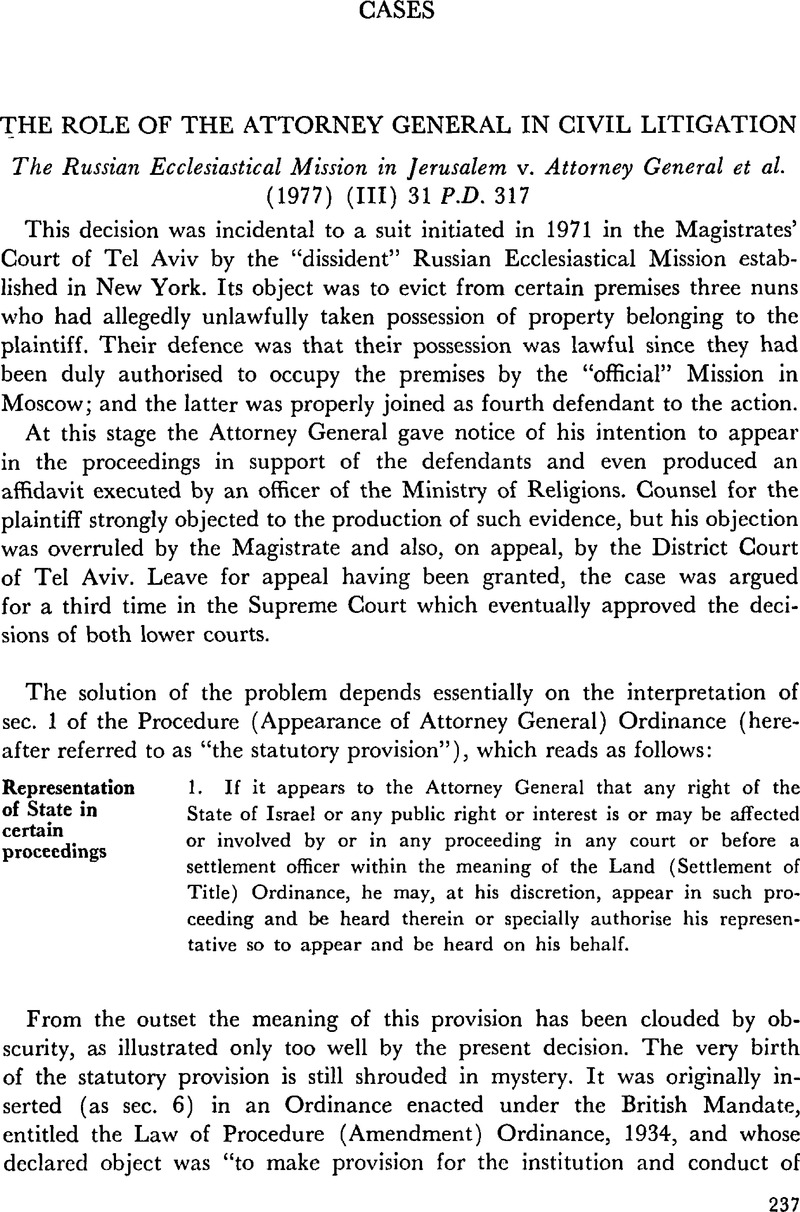No CrossRef data available.
Published online by Cambridge University Press: 12 February 2016

1 Dated 21 April 1968. The entire Ordinance comprising two sections was published in English translation, 2 L.S.I. (N.V.) 29.
2 23 L.S.I. 32: The text also appears in (1971) 6 Is.L.R. 410 and see P. Elman's note, ibid. 398, at 408–9.
3 Halber v. A.G. (1956) 11 P.M. 361.
4 The proposal was eventually rejected by the Rules Committee as superfluous.
5 Civil Procedure Amendment (The State as a Party) Law, 1958, sec. 2 (12 L.S.I. 138).
6 Loc. cit., sec. 8.
7 E.g., the prohibition of granting an injunction or an order of specific performance against the State (sec. 5), the special modes of execution of judgments against the State (sec. 7), the latter's exemption of court fees (sec. 8), etc.
8 Civil Procedure Rules, 1963, r. 24, based on Order 15.6 (2) (b)(i) of the English Rules of the Supreme Court.
9 This rule forms part of Chap, vi of the Civil Procedure Rules on Written Pleadings, which applies exclusively to the parties themselves.
10 [1971] P. 188, at 198 (emphasis added), and authorities quoted.
11 Feinstein & Litvin v. Harlap (1955) 9 P.D. 1760, 1762; but contrast A.G. v. Keren Kayemeth Leisrael (43 A.L.R. 133), where the appeal of the Attorney General was dismissed since he had not be formally joined as a party but had merely intervened in the proceedings before the lower court.
12 Supra n. 10.
13 Incidentally, the possibility of acting as amicus curiae mentioned in the Halber case (supra n. 3) was imported into Palestine, subject to severe restrictions, by the Advocates Ordinance, 1938; this enactment was replaced by the Chamber of Advocates Law, 1961, so that English practice on this specific point is of scant assistance for the construction of the 1934 Ordinance.
14 Loc. cit.
15 In French legal language it is called partie jointe, but the best authorities agree that this is a misnomer (see: Dalloz, Encyclopédie, Répertoire de Procédure civile et commerciale, vol. 2, v° Ministére Public § 65Google Scholar; Solus, et Perrot, , Droit Judiciaire Privé (Paris, 1961), I, § 862, p. 728, n. 1Google Scholar; cf. Vincent, J., Procédure civile (Dalloz, 15th ed., 1971) § 183, p. 178Google Scholar; “il n'est l'adversaire de personne”. The French system has been adopted in many countries. See e.g., Afchar, S., “Le Rôle du Ministére Public dans le Procés Civil en Iran” (1978) 55 Revue de Droit Int. et de Droit Comparé 353, at 363.Google Scholar
16 Published in Young, , Corps de Droit Ottoman (Oxford, 1905) vol. I, pp. 176–7.Google Scholar
17 The practice of the Attorney General has constantly been to “enter an appearance” in like manner as a defendant was required to do in a district court under the former Rules of Court; but this formality, which has always been rather futile, has become completely meaningless since it has been abolished even in respect of a party to the action.
18 Cf. Ha-etsni et al. v. Amos Ben-Gurion (1957) 11 P.D. 403, 414.
19 Cf. Sansour v. Consul-General of Greece et al. (1972) (II) 26 P.D. 328, 334, quoted in the decision under review at 322–3. The substance of this case, but not its procedural aspect, was discussed by Prof.Blum, Y. in (1973) 8 Is.L.R. 580–591.Google Scholar
20 In Guardian Anstalt & David v. Ad-Nir et al. (1965) 51 P.M. 136, the Attorney General was invited to appear and advise the district court of Beersheba on the question of that court's competence to order the dissolution of a company. In view of the public interest involved he accepted the invitation and inevitably “entered an appearance” (cf. supra n. 17).
21 But under our Rules of Court there are certain matters in which the Attorney General must be cited as a respondent to the suit (e.g. child adoption, C.P.R., r.341; or declaration of age, r.363C). It will be noted that notice of almost every petition to the court of probate must be given to the Attorney General through the office of the Administrator General (Succession Rules, 1965, r.54).
22 Mizrahi et al. v. Mash'al et al. (1948) I Hamishpat 9.
23 A. Peres v. Iraq Petroleum Company Ltd. (1956) 10 P.D. 1413, at 1422 (emphasis added).
24 Similarly in Sansour Consul-General of Greece (supra n. 19), the foreign diplomat concerned did not even bother to defend the suit and the Attorney General had to intervene at the last minute before the Execution Officer to ensure that the principles of diplomatic immunity be upheld.